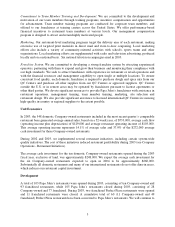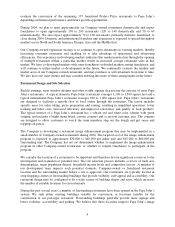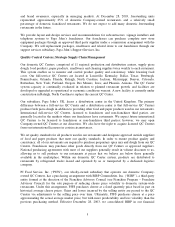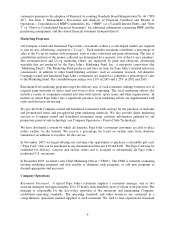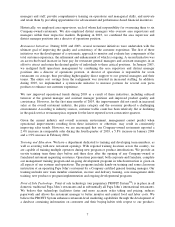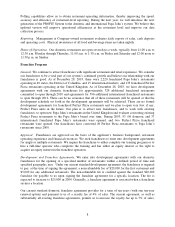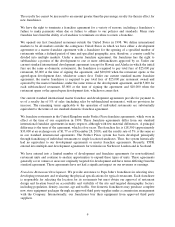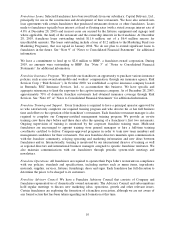Papa Johns 2003 Annual Report Download - page 14
Download and view the complete annual report
Please find page 14 of the 2003 Papa Johns annual report below. You can navigate through the pages in the report by either clicking on the pages listed below, or by using the keyword search tool below to find specific information within the annual report.
13
2. The restaurant industry is intensely competitive with respect to price, service, location and food
quality, and there are many well-established competitors with substantially greater financial and
other resources than the Papa John’s system. Some of these competitors have been in existence for a
substantially longer period than Papa John’s and may be better established in the markets where
restaurants operated by us or our franchisees are, or may be, located. Experience has shown that a
change in the pricing or other marketing or promotional strategies of one or more of our major
competitors can have an adverse impact on sales and earnings of Papa John’s and our system-wide
restaurant operations.
3. An increase in the cost of cheese or other commodities could adversely affect the profitability of our
system-wide restaurant operations. Cheese costs, historically representing 35% to 40% of our food
cost, and other commodities are subject to seasonal fluctuations, weather, availability, demand and
other factors that are beyond our control. Additionally, sustained increases in fuel and utility costs
could adversely affect the profitability of our restaurant and QC Center businesses.
4. Changes in consumer taste (for example, changes in dietary preferences that could cause consumers
to avoid pizza in favor of foods that are perceived as more healthful), demographic trends, traffic
patterns and the type, number and location of competing restaurants could adversely affect our
restaurant business.
5. Health- or disease-related disruptions or consumer concerns about the commodity supply could
negatively impact the availability and/or cost of such commodities, thereby adversely impacting
restaurant operations and our financial results.
6. System-wide restaurant operations are subject to federal and state laws governing such matters as
wages, working conditions, citizenship requirements and overtime. A significant number of hourly
personnel employed by our franchisees and us are paid at rates related to the federal minimum wage.
Accordingly, further increases in the federal minimum wage or the enactment of additional state or
local “living wage” proposals will increase labor costs for our system-wide operations. Additionally,
labor shortages in various markets could result in higher required wage rates.
7. Any or all of the factors listed in 1. through 6. potentially adversely impacting restaurant sales or
costs could be especially harmful to the financial viability of franchisees in under-penetrated or
emerging markets. A decline in or failure to improve financial performance for this group of
franchisees could lead to unit closings at greater than anticipated levels and therefore impact
contributions to marketing funds, PJFS and support services efficiencies and other system-wide
results.
8. Domestically, we are dependent on sole suppliers for our cheese, pizza sauce, flour, chicken and
meat toppings and our thin crust dough products. Alternative sources for these ingredients may not
be available on a timely basis to supply these key ingredients or be available on terms as favorable to
us as under our current arrangements. Domestic restaurants purchase substantially all food and
related products from our QC Centers. Accordingly, both our corporate and franchised restaurants
could be harmed by any prolonged disruption in the supply of products from our QC Centers.
Additionally, domestic franchisees are only required to purchase proprietary spice mix and dough
from our QC Centers and changes in purchasing practices by domestic franchisees could adversely
affect the financial results of our QC Centers.
9. We established a captive insurance company and began the current insurance program with
franchisees in 2000. Over the last few years, premium rates charged to franchisees have increased


